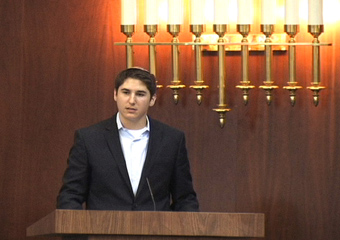The challenge of the third generation
Permanent link
Jason Silberman, a grandchild of survivors, paid tribute to the enormous contribution Holocaust survivors have made to the Chicago community in passing their legacy of courage to future generations at the 66th annual Holocaust Memorial Observance held May 1. Sponsored by She’erit HaPleitah of Metropolitan Chicago, the umbrella organization for Chicago-area Holocaust survivor groups, the service traditionally is the largest gathering of Holocaust survivors in the Midwest and one of the largest in the United States.
“Zachor”—The Hebrew word meaning “remember,” has evolved throughout Jewish history, and has rightfully become somewhat of a commandment and challenge to generations of Jews living after the Holocaust. But as new generations are born into this world, and the generation of Holocaust survivors is becoming smaller and more fragile every day, the commandment of “Zachor” is becoming more challenging and at the same time more important than ever.
All four of my grandparents were survivors of the Holocaust. They were the only members of their families to survive. My father’s parents were Esther and Tobias Silberman, Zichronam Livracha (may their memories be for a blessing), and my mother’s parents were Joseph and Mania Birnberg, Zichronam Livracha. As a third generation of Holocaust survivors, I know the challenge of carrying on my grandparents’ stories and legacies. Because three of my grandparents died before I reached the age of 12, I was unable to ask questions or talk at all with them about their experiences in the Holocaust. Unfortunately, I am one among many grandchildren of Holocaust survivors who never reached out to their grandparents to ask them about their lives in Europe. Which brings me to a question—how can one remember what they don’t yet know?
At our Passover seders just a few weeks ago, we stated that “B’chol dor va’dor, Chayav adam Lirot et atzmo ke’ilu hu yaztah m’mitzrayim,” that “In every generation every person must see themselves as if they were brought out of Egypt.” How do we connect to an event that happened so long ago? We ask questions of our elders and teachers and look at the sources of the Passover story in the Torah. In order to effectively transmit our grandparents’ experiences and legacies, we must not only study history through the textbooks we read in school or during class field trips to the Holocaust museum. We must ask questions of the survivors and of our parents. Survivors—keep telling your stories and stories about your families and your life before, during and after the war. Children of survivors—talk to your children and tell us what you know and what you remember of your early childhood. Tell us as much as you can about our grandparents—what they told you verbally and through their behavior. Like the four sons in the Haggadah, there are those of us who have asked, those who don’t care to ask, and those of us who don’t know to ask, but that doesn’t relieve you of your responsibility to tell us what you know. And to my generation, it is our responsibility as direct descendants of the Shoah to tell our grandparents’ stories to our friends, to our classmates, to our co-workers, to our teachers and to the world.
With social media such as Facebook and Twitter, the sharing and spreading of stories and knowledge of the Holocaust has great potential. But there are also people who use these means to deny the Holocaust and to spread hatred against Israel. It is the responsibility of the third and fourth generations to use social media productively to help others become more aware and knowledgeable about the Holocaust. During this Holocaust remembrance week, for those of you who use Facebook, every day post a status telling a short story about how your family members survived the Holocaust or about others who were lost during the war. It is through these productive methods of sharing stories, that others can know about and thus remember the atrocities of the Holocaust.
Every year that goes by, we become more removed from the Holocaust, and our ability to connect and sympathize with Holocaust survivors becomes harder to channel. However, the obligation to remember becomes more important than ever. Despite the difficulties, I remain confident that the leaders of the third generation will make certain that the legacies of Holocaust survivors and their families will live on in the future. Though the generation of Holocaust survivors is diminishing, my generation and all future generations will grow more determined to zachor…to remember, to carry forward your stories and legacies, and to never forget.



.jpg)



